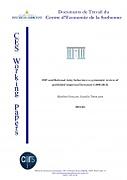Voluntary medical male circumcision and HIV in Zambia: Expectations and observations
November 27, 2019

Guillon M. et Thuilliez J. (2015) "HIV and Rational risky behaviors: a systematic review of published empirical literature (1990-2013)," Document de travail du Centre d'Economie de la Sorbonne 15065, Université Panthéon-Sorbonne (Paris 1), Centre d'Economie de la Sorbonne.